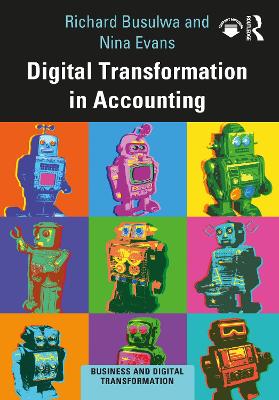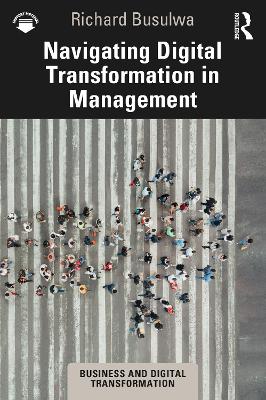Business and Digital Transformation
3 total works
Hospitality Management and Digital Transformation
by Richard Busulwa, Nina Evans, Aaron Oh, and Moon Kang
Hospitality managers are at a critical inflection point. Digital technology advancements are ramping up guest expectations and introducing nontraditional competitors that are beginning to disrupt the whole industry. The hospitality managers whose organizations are to thrive need to get their organizations into a position where they can effectively leverage digital technologies to simultaneously deliver breakthroughs in efficiency, agility, and guest experience.
Hospitality Management and Digital Transformation is a much-needed guidebook to digital disruption and transformation for current and prospective hospitality and leisure managers. The book:
• Explains digital technology advancements, how they cause disruption, and the implications of this disruption for hospitality and leisure organizations.
• Explains the digital business and digital transformation imperative for hospitality and leisure organizations.
• Discusses the different digital capabilities required to effectively compete as a digital business.
• Discusses the new and/or enhanced roles hospitality and leisure managers need to play in effecting the different digital capabilities, as well as the competencies required to play these roles.
• Discusses how hospitality and leisure managers can keep up with digital technology advancements.
• Unpacks more than 36 key digital technology advancements, discussing what they are, how they work, and how they can be implemented across the hospitality and leisure industry.
This book will be useful for advanced undergraduate and postgraduate students studying strategic management, IT, information systems, or digital business–related courses as part of degrees in hospitality and leisure management; as well as practitioners studying for professional qualifications.
Digital Transformation in Accounting is a critical guidebook for accountancy and digital business students and practitioners to navigate the effects of digital technology advancements, digital disruption, and digital transformation on the accounting profession.
Drawing on the latest research, this book:
- Unpacks dozens of digital technology advancements, explaining what they are and how they could be used to improve accounting practice.
- Discusses the impact of digital disruption and digital transformation on different accounting functions, roles, and activities.
- Integrates traditional accounting information systems concepts and contemporary digital business and digital transformation concepts.
- Includes a rich array of real-world case studies, simulated problems, quizzes, group and individual exercises, as well as supplementary electronic resources.
- Provides a framework and a set of tools to prepare the future accounting workforce for the era of digital disruption.
This book is an invaluable resource for students on accounting, accounting information systems, and digital business courses, as well as for accountants, accounting educators, and accreditation / advocacy bodies.
Navigating Digital Transformation in Management provides a thorough introduction to the implications of digital transformation for leaders and managers. The book clearly outlines what new or enhanced roles and activities digital transformation requires of them. The book takes a practical approach and shapes an actionable guide that students can take with them into their future careers as managers themselves.
With core theoretical grounding, the book explains how the digital transformation imperative requires all organizations to continuously undertake digital business transformation to adapt to ongoing digital disruption and to effectively compete as digital businesses. The book discusses the critical roles managers need to play in establishing, facilitating, and accelerating the day-to-day activities required to build and continuously upgrade these capabilities.
Drawing on cutting edge research, this textbook:
- Explains how digital technology advancements drive digital disruption and why digital business transformation and operating as a digital business are critical to organization survival
- Unpacks the different digital business capabilities required to effectively compete as a digital business
- Considers the new or digitally enhanced competencies required of leaders, managers, and their supporting professionals to effectively play their roles in digital transformation
- Discusses how leaders, managers, and their supporting professionals can keep up with digital technology advancements
- Unpacks key digital technology advancements, providing a plain language understanding of what they are, how they work, and their implications for organizations
Enriched with pedagogical features to support understanding and reinforce learning, such as reflective questions, learning summaries, and case studies, and supported by a suite of instructor materials, this textbook is an ideal choice for teachers that want to enable their information systems, information technology, and digital business students to compete and thrive in the contemporary business environment.


